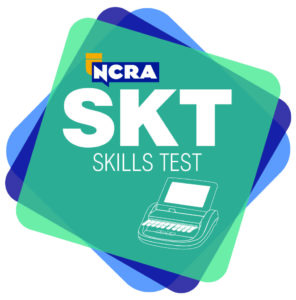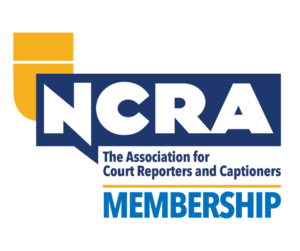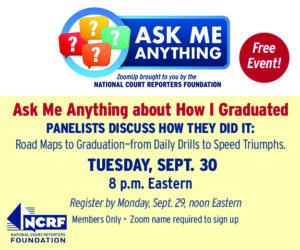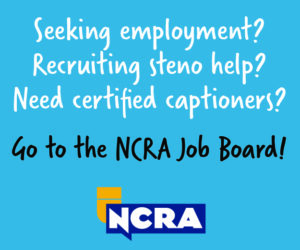
Tiffany Nicole Headley is a CART provider/court reporter in Deatsville, Ala. She and her husband have three sons. Evan, the oldest, is living in Mobile, Ala., attending the University of South Alabama. Ethan is almost 16, and Elijah is 11. She also has five pets: three dogs, a cat, and a horse. She graduated from Prince Institute in Montgomery, Ala., in December of 2012.
JCR | What year did you start doing CART?
TH | August of 2012 while still in school.
JCR | What year did you obtain your Alabama CCR?
TH | I believe it was October of 2016.
JCR | When did you begin freelancing?
TH | I’ve always freelanced. In CART it is considered freelancing as well. We are independent contractors just like court reporters, but I started freelance reporting in November of 2016.
JCR | How did you get introduced to court reporting and what made you want to become one?
TH | I was first introduced to court reporting after I graduated high school in 1998. My younger sister’s best friend was Sarah Prince’s granddaughter, and she told me about the school because I had mentioned a time or two that I was thinking about going into the legal field, but I was unsure for what. I checked into it, and it seemed like the perfect fit for my future plans career-wise and family-wise, but the timing wasn’t right since my husband and I were getting married in January of 1999. I did, however, start in 2001 for the first time, but I had to leave in 2003 due to pregnancy and the stress it was putting on me.
After a few years, I still wanted to pursue it, and I enrolled after our family was complete. So I went back at 28 years old with a family of five with three kids who all were involved in some sport or activity at some point throughout my schooling. I attended online for the first year, and throughout the program, I did online and in-house classes.
JCR | You’ve done CART and transitioned into freelance reporting. Has that been a difficult transition? Do you have any advice for someone else looking to do the same?
TH | It was very difficult at first for several reasons. The travel, multiple speakers, random places that you have to take depos, and getting transcripts done was a huge change for me. As a full-time CART Provider, I worked from home the majority of the time, and I only traveled a few times a year.
As far as adjusting to multiple speakers, CART is more like doing a Lit take than a Q&A. It’s a lot easier to get into a rhythm with CART to me. Basically, you have one professor and the occasional student asking a question. Most of you know, that’s very different in the court reporting field. You can have multiple voices, so it’s keeping up with who said what, constant back and forth, along with interruptions and/or everyone talking over each other, etc.
I will say, though, that I believe that transcripts were the biggest adjustment for me. When you do CART, you don’t always have to turn a transcript in. If you do, you simply have to do a quick spellcheck, scanstop, and look over it to make sure you paragraphed properly and used the right punctuation. It is more pressure because you are writing realtime all the time. There is someone on the other end depending on you for their education. You really need to be on it. Those people need you producing clear and concise captions at that very moment. There is not much room for error. The student/consumer may or may not be reading it later.
When producing transcripts for depositions and court, it is very different and so much more involved. You have to go back over your work with a fine-toothed comb with audio backup, if you use it. The scoping, then proofreading, and making sure that the record is 100 percent accurate. You are listening to the same material over and over again. Needless to say, that was very exhausting at first.
As far as advice I have for someone transitioning: Make sure you keep a lot of court reporter mentors and friends in your circle. I promise they are valuable resources when making that change. In all honesty, if it was not for my court reporting mentors and friends, I would’ve probably given up on this a long time ago. It is just such a different realm for me. You definitely have to stay super focused on the task at hand and manage your time wisely so your work is turned in in a timely manner so the transcripts are returned to the client on time. Remember they have a deadline too, and they need their records to review before going further with a case.
JCR | What’s your must-have in your bag?
TH | For court reporting it is my water, long extension cord, exhibit stickers, and pens.
For CART it is an extension cord and multiple connection cables, i.e. HDMI cord, high-speed USB plug, a converter plug for projectors that may still be old school and require those bulky plugs with the thumb screw, and my handy-dandy USB Type-C Multi-Adapter. At any given time, you could have several things plugged in at one time, and newer computers don’t always have multiple USB ports.
JCR | Tell me the best piece of advice you’ve received from another court reporter that you’d love to pass along.
TH | There’s been so many things that have been helpful. I have a great circle, but there are two big things I’ve learned. First of all, do not be afraid to clarify what someone is saying if you don’t understand them and/or stopping the attorneys from talking over one another during proceedings. Second, never become too reliant on your audio backup. Always have a fail-safe because electronics fail, so make sure you have a backup for your backup.












